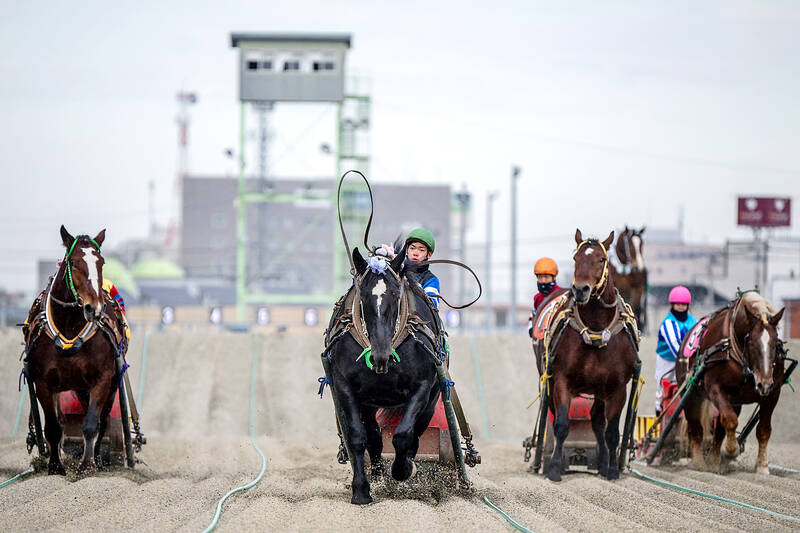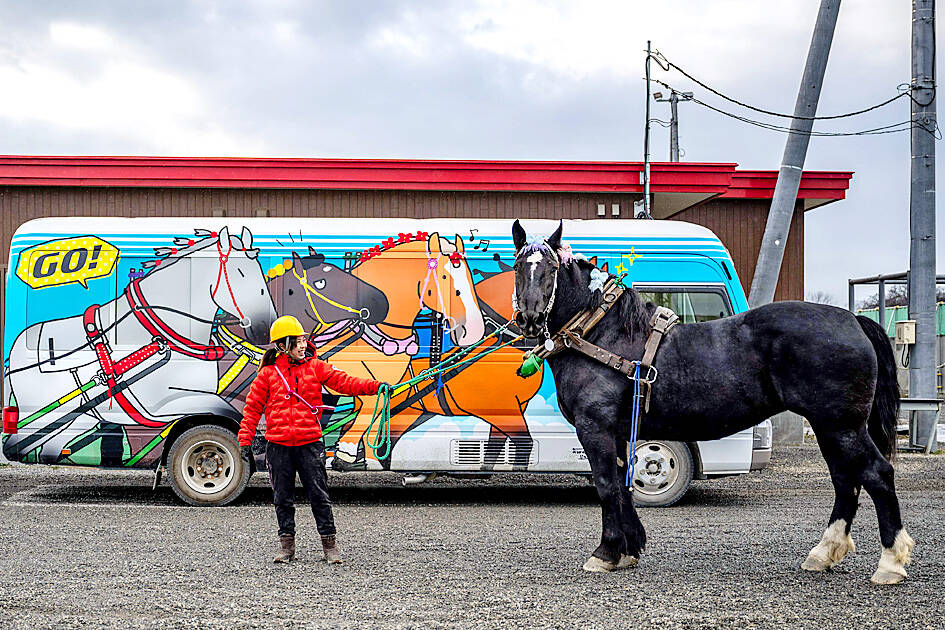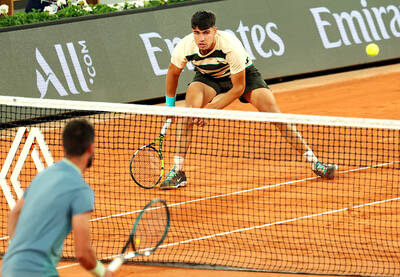Speed is not everything at one racecourse in Japan, where the unpredictable stop-and-start drama of the world’s slowest horse race has drawn new fans eager to bet on their sturdy favorite.
A fanfare plays, the gates flip open and they are off — but at a plod rather than a gallop, pulling heavy sleighs in a tradition that harks back more than a century.
The Banei Keiba races are held in Obihiro, a city in northern Japan’s Hokkaido, where spectators cheer on the muscular workhorses moving at the pace of a brisk human walk.

Photo: AFP
Eight equine competitors kicked up dust on a recent afternoon as they powered over the first of two mounds on the 200m track.
However, they soon began to stop, taking the first of several breaks to catch their breath, which billowed in the winter air.
The slow progress “builds a little bit of suspense,” 24-year-old Australian tourist Esther McCourt said, marveling at the horses’ size.

Photo: AFP
“No matter how good people or horses look in the beginning, the crucial part is the last 50m, so it can change at any time,” she said.
The popularity of Banei Keiba had dwindled until renewed marketing efforts coincided with a surge of interest during the COVID-19 pandemic, when people began to watch the races and place bets online.
Those casual gamblers along with dedicated fans have boosted the event’s annual sales to ¥55.5 billion (US$373.5 million) — a fivefold increase from their low point in 2011.
Banei Keiba developed when Japanese settlers migrated to Hokkaido, a sparsely populated island with long, bitter winters.
They relied on horses known as banba to clear fields, transport goods and operate mines, and would pit them against each other in tug-of-war games and other contests at local festivals.
Banba are twice as heavy as racing thoroughbreds, and the sleighs they tug weigh more than 600kg.
Jockeys standing on the sleighs shout and whip the horses with long reins to keep them going.
Trainers such as Yoshiyuki Hattori deny any accusations of cruelty, saying the strong creatures are treated with care and are not forced to pull loads above their capacity.
“If thoroughbreds were born to run, banba were bred to haul things,” said Hattori, whose horses have won many race trophies.
“They worked in fields. They worked for us. We want to continue this history,” he said.
For Hattori, Banei races are “more dynamic” than the “visual experience” of regular horse racing.
“This moves you physically as you cheer,” he said.
Three other cities in the region used to host similar races, but they all stopped under mountains of debt in 2006.
The long-stagnant Japanese economy had hit Banei Keiba hard, and the regular punters who kept it going were getting older.
Obihiro Racecourse, now the tradition’s sole custodian, made efforts to attract more young families and tourists by cleaning up the facility and making it smoke-free.
They set up a mini zoo and launched marketing campaigns including tie-ups with popular smartphone games to rejuvenate the attraction.
Now there are about 750 horses taking part in the races, kept by 28 trainers, 150 caretakers and 21 jockeys.
One of the caretakers, 21-year-old Yuno Goto, was busy attaching pale pink and blue fluffy bows and ribbons on a banba’s mane ahead of the race.
She said she dreams of becoming a jockey one day, and called the event “a great opportunity to expose people to this culture and to provide a different experience from other horse races.”
Spectator Taichi Yamada, 27, who moved to the region last year, also said knowing the race’s origins adds to its appeal.
“This is a form of interaction between humans and animals. I hope it will continue as a piece of history,” he said. “It must be tough for horses to pull this much weight. You can’t help but cheer for them.”

‘DREAM’: The 5-0 victory was PSG’s first Champions League title, and the biggest final win by any team in the 70-year history of the top-flight European competition Paris Saint-Germain won the Champions League for the first time as Luis Enrique’s brilliant young side outclassed Inter on Saturday in the most one-sided final ever with teenager Desire Doue scoring twice in an astonishing 5-0 victory. Doue supplied the pass for Achraf Hakimi to give PSG an early lead and the 19-year-old went from provider to finisher as his deflected shot doubled the advantage in the 20th minute. Doue scored again just after the hour mark, ending any doubt about the outcome before Khvicha Kvaratskhelia ran away to get the fourth and substitute Senny Mayulu, another teenager, made it five. Inter were

FRUSTRATION: Alcaraz made several unforced errors over four sets against Bosnian Damir Dzumhur, who had never made it past the third round in a major competition Defending champion Carlos Alcaraz reached the fourth round of the French Open after laboring past Damir Dzumhur 6-1, 6-3, 4-6, 6-4 in the Friday night session. The second-seeded Spaniard had never before played Dzumhur, a 33-year-old Bosnian who had never been past the third round at any major tournament. “I suffered quite a lot today,” Alcaraz said. “The first two sets was under control, then he started to play more deeply and more aggressively. It was really difficult for me.” Dzumhur hurt his left knee in a fall in the second round, and had treatment on Friday on his right leg during the

The horn sounded on Wednesday night to signal a third straight trip to the Stanley Cup Final, as the Florida Panthers celebrated merely by hopping over the boards and several heading over to congratulate goaltender Sergei Bobrovsky. It was a subdued celebration seemingly more befitting a regular-season win for the reigning Cup champs. “I remember a few years ago, it felt like such an accomplishment from where we were at one point,” forward Matthew Tkachuk said, adding: “It’s all business and we’ve got a bigger goal in mind.” The Panthers closed out the Carolina Hurricanes in five games, with a 5-3 victory in

STRONG CONNECTION: Although she has considered switching nationalities, Garland said that if it was not for Taiwan’s support throughout her career, she would not be in Paris British-Taiwanese player Joanna Garland on Tuesday became the first Taiwanese to clinch a victory in a main singles draw of the French Open since 2020 after she outlasted the US’ Katie Volynets in Paris. The world No. 175, Taiwan’s highest-ranked female player in singles, said she would rely on her self-belief as she prepares for her second-round match at the French Open after overcoming a serious injury to qualify for a maiden Grand Slam appearance. After navigating her way through the qualifiers last week, Garland secured her first win at the main draw of a Grand Slam by battling past world No.